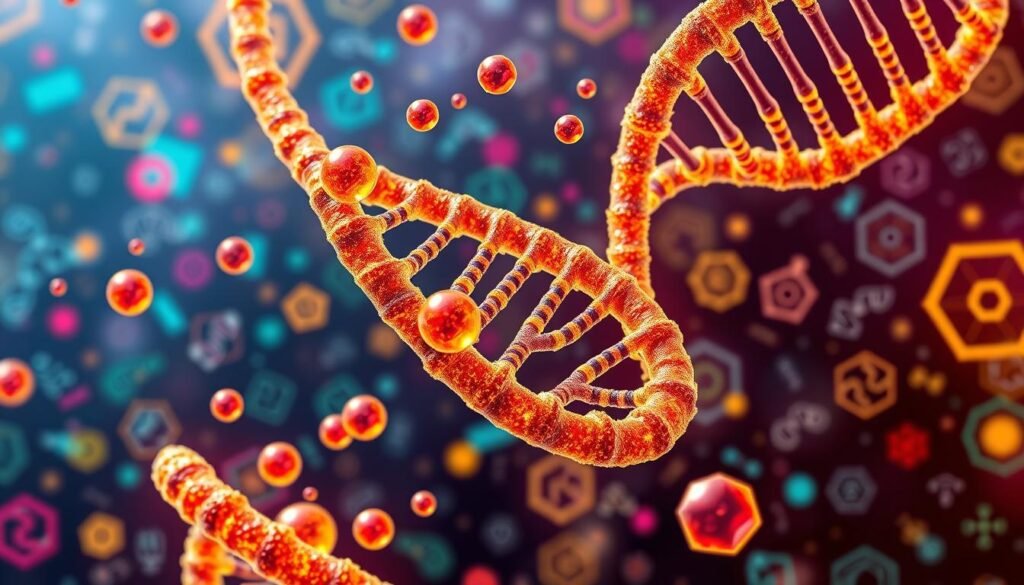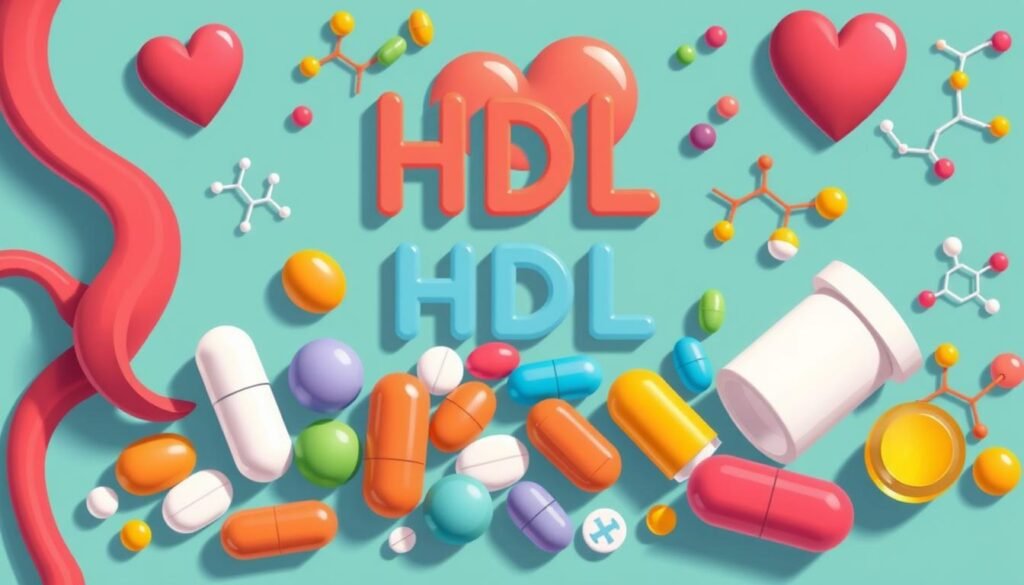Did you know a good HDL cholesterol level is 60 milligrams per deciliter (mg/dL) or higher? But, if it goes above 80 mg/dL, it might be a problem. HDL is known as the “good cholesterol” because it helps remove excess cholesterol. However, too much HDL can be harmful, making it vital to understand what causes high HDL levels.
Genetics, lifestyle, and diet all affect HDL levels. It’s interesting that illnesses or heart attacks can skew test results. That’s why staying updated on your cholesterol health is essential. To learn more about HDL cholesterol and managing its levels, keep reading.
Key Takeaways
- HDL levels above 60 mg/dL are generally considered protective against heart disease.
- Higher HDL levels, particularly over 80 mg/dL, can be linked to cardiovascular concerns.
- Diet and exercise significantly influence HDL cholesterol levels.
- Genetic factors also play a crucial role in determining HDL levels.
- Lifestyle changes can effectively manage cholesterol levels, promoting heart health.
- Regular cholesterol screenings are recommended to monitor HDL levels and overall heart health.
Understanding HDL Cholesterol
HDL cholesterol is known as good cholesterol and is crucial for heart health. It helps remove fats from the arteries, lowering heart disease risk. Unlike LDL or bad cholesterol, HDL helps carry cholesterol away from the arteries.
For women, optimal HDL levels are about 46 mg/dL or higher. Men should aim for at least 42 mg/dL. HDL’s heart-protecting power is strongest at about 54 mg/dL.
However, very high HDL levels can be harmful, especially for postmenopausal women. Certain medications, like oral contraceptives, can increase HDL. Also, genetics might cause higher HDL, as seen in some people of Japanese heritage.
The link between high HDL and heart health isn’t simple. For example, hypothyroidism patients might have increased HDL, posing risks. Those on dialysis may experience worsened inflammation. Both low and high HDL levels can threaten heart health, highlighting the need for balance.
What Causes High HDL Levels?
Many things can make your HDL cholesterol levels go up. High-density lipoprotein (HDL) is known as “good cholesterol.” Understanding why HDL levels rise is key. This is especially true when looking at genetics and where your family comes from.
Genetic Factors Involved
Your genes play a big part in your cholesterol levels. For example, changes in the CETP gene can push HDL levels over 150 mg/dL. Knowing your family’s health history helps assess heart disease risks.
Some people have rare conditions, like Tangier disease or ApoA1 deficiency. These can drastically change HDL amounts. It shows how genes and different types of HDL cholesterol interact.
Impact of Ancestry on HDL Levels
Your ancestry affects your HDL levels and how your body handles cholesterol. People from Japan often have high HDL levels due to their genes. This tells us that where you come from matters for your cholesterol.
It also helps doctors make plans that are just right for you. Everyone should keep an eye on their HDL levels through tests and healthy living. This is even more crucial for people from certain backgrounds because of their unique heart risks.

| Ancestry | Typical HDL Level Range (mg/dL) | Notes |
|---|---|---|
| Japanese | 60-80 | Higher HDL levels linked to genetics |
| Caucasian | 40-60 | Varied results based on lifestyle |
| African American | 48-58 | Often lower HDL compared to other ancestries |
Looking at genetics and where you come from helps understand HDL cholesterol levels better. You can learn more from resources like WebMD. They explain how these factors impact your health.
The Role of Diet and HDL
Diet is key in managing HDL cholesterol levels. Eating heart-healthy foods helps keep these levels stable or even raises them. Knowing which foods to eat and which to skip is vital for a good HDL balance.
Heart-Healthy Foods
Choosing the right foods can boost HDL cholesterol. Here are some great options for any meal plan:
- Fruits and vegetables full of dietary fiber
- Whole grains like oats and barley
- Omega-3 sources, such as fatty fish, salmon, and sardines
- Nuts and seeds, especially walnuts and chia seeds
- Healthy oils such as olive and canola oil
The Mediterranean diet focuses on these foods and can improve heart health. It helps increase good HDL levels while lowering health risks.
Foods to Avoid for Balanced HDL Levels
Certain foods harm HDL cholesterol. Knowing what to avoid is key for balance:
- Processed and fried foods rich in trans fats
- High-saturated fat items like fatty meats and full-fat dairy
- Sugar-filled drinks which increase unhealthy triglycerides
- Refined carbs, especially those with high glycemic loads
Avoiding these foods is crucial for anyone wanting healthy HDL levels and heart well-being. Eating right and avoiding bad foods are the basics for balanced nutrition and better HDL cholesterol.
Exercise and HDL Levels
Regular physical activity is key to raising HDL cholesterol, good for your heart. Some exercises can really boost this good lipoprotein. Each type of exercise helps your heart in its own way.
Types of Exercise That Boost HDL
Aerobic exercises work great for HDL. You can try:
- Walking
- Jogging
- Swimming
- Cycling
Doing these regularly can up your HDL by about 2.5 mg/dL on average. It’s vital to mix different exercises for the best result.
Recommended Frequency and Duration
The American Heart Association suggests 150 minutes of moderate or 75 minutes of tough exercise weekly. Hitting the gym three to four times a week for at least 20 minutes helps raise HDL. More exercise time means even higher HDL, with every 10 extra minutes adding 1.4 mg/dL.
An active lifestyle lowers bad fats while boosting HDL. Staying active is crucial; not moving enough lowers HDL levels.

| Type of Exercise | Impact on HDL Levels |
|---|---|
| Walking | Moderate increase, especially with consistent practice |
| Jogging | Significant boost, particularly when sustained longer |
| Swimming | Effective for increasing HDL, low impact |
| Cycling | High intensity leads to greater HDL improvement |
Creating a balanced exercise program is a big win for your HDL and heart health.
Medications and HDL Levels
It’s key to understand how medications and HDL levels work together for cholesterol control. Different meds can either help or hurt HDL cholesterol, which matters for heart health. It’s smart to talk to your doctor. This ensures you know how your meds could change your cholesterol, making better health choices possible.
Medications That May Elevate HDL
Some meds can raise HDL, which might help your heart. Here are a few:
- Oral Contraceptives: These often have estrogen, which can up your HDL.
- Statins: While they mainly cut LDL cholesterol, they can boost HDL too.
- Certain Antidepressants: Some in this group can lift your HDL levels.
- Hormone Replacement Therapy: Using estrogen can positively affect HDL with its hormone therapy HDL impact.
Impact of Hormone Therapy on HDL
Hormone therapy is big on changing HDL cholesterol levels. As women hit menopause, estrogen goes down, messing with cholesterol. But, hormone replacement can boost HDL. This shows the importance of discussing treatments, especially with menopause or hormonal imbalances. To learn more about cholesterol, click here.

The Influence of Liver Disease on HDL
The liver helps control HDL cholesterol levels, which are important for liver health. Any liver function problems can badly affect HDL levels. This is crucial to know for overall health.
In cirrhotic patients, HDL cholesterol often drops. These patients’ enzymes that mature and metabolize HDL don’t work well. This results in more of the bigger HDL2 subclass. Changes in HDL might harm their heart health.
Research shows that liver disease changes important HDL proteins like apoA-I and apoC-III. These changes might weaken HDL’s ability to protect the heart. Better cholesterol movement from cells means better outcomes for patients with liver problems.
Also, people with very high HDL might have more liver problems. This relationship shows how vital liver health is for managing HDL cholesterol. Not taking care of the liver can lead to abnormal fat levels in the blood.
| Parameter | Cirrhotic Patients | Healthy Controls |
|---|---|---|
| HDL Cholesterol Levels | Reduced | Normal |
| Enzyme Activities | Suppressed | Normal |
| HDL Composition | Shift towards HDL2 subclass | Predominantly HDL3 |
| Associated Proteins Altered | ApoA-I, ApoC-III, ApoE | Not significantly altered |
| Cholesterol Efflux Capacity | Stronger association with mortality | N/A |
Keeping an eye on liver health is key for managing HDL cholesterol. The link between liver disease and HDL levels is complex. But focusing on liver health can help manage HDL cholesterol. This protects against more health issues.
Other Medical Conditions Affecting HDL Levels
Many medical conditions can change HDL cholesterol levels. Hypothyroidism shows a special link to HDL levels. In this condition, the body’s metabolism slows down, including how it handles lipoproteins.
This can lead to changes in HDL cholesterol. This hypothyroidism HDL relationship might cause higher HDL levels. But, this doesn’t always mean better heart health.
Hypothyroidism and HDL Relationships
People with hypothyroidism have a unique metabolic condition. Their thyroid’s poor function affects cholesterol management in the body. This connection helps doctors spot patients who may face cholesterol issues.
For more on cholesterol management, visit NHLBI.
Effects of Inflammation on HDL Particle Function
Inflammation changes how well HDL works. Both short-term and lasting inflammation can affect the inflammation and HDL function. This reduces HDL’s ability to protect the heart.
When inflamed, HDL particles change and may harm heart health. It’s important to stay aware of these conditions and their effects on HDL. For more details, check Easy Heart Boost.
Conclusion
Understanding causes of high HDL is key to heart health. High levels of “good cholesterol” are mostly good. But very high levels can be a problem for health.
Different things influence HDL levels. These include genes, diet, exercise, and certain health conditions. Knowing these factors helps manage HDL levels.
About 93 million Americans struggle with high cholesterol. It’s important to get regular health checks. Talking to doctors helps manage HDL levels. With heart disease as a top killer in the U.S., starting early is key.
People need to live heart-healthy lives. Making changes in lifestyle can greatly improve cholesterol levels.
High HDL cholesterol is complex. Knowing what affects HDL levels helps keep them in check. Staying informed and active in health matters can lead to better heart health.